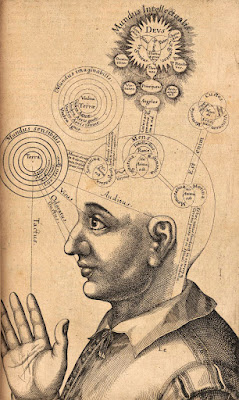Three types of thinking: Scientific, Artistic & Religious
The first time I came across this question was in the course of writing my as-yet unpublished book Human Thought as Recursion. In it, I considered the role which was played by rigour in disciplining the thinking process, and as leading it down the long, meandering path of Infinite Recursion.
Recently, I came across a question along the lines of "[w]hat is the difference between artistic and scientific thinking?", and my prior musings came back to me; it then occurred to me that it would be helpful to discuss some useful categories on the subject.
In life, of course, one rarely meets either of these sorts of thinking alone. They are usually all mixed up together in different proportions.
Scientific thinking, that is, thinking in accordance with the Scientific Method, with its emphasis on the falsifiability of hypotheses, lies highest on the scale of rigour. One must take care to discipline one’s inquiry by adhering to strict methodologies and various epistemological concerns. Departures must be justified at length, and some scholars spend entire careers commenting on the field of scientific methodology. Which is not to say that Scientific thinking - the kind that adheres to Scientific Method, and not the kind of thinking which I attribute to "the Cult of Science" - is rigid and relentlessly orthodox. Karl Popper (c.f. Thomas Kuhn) shows that a scientific mind can very much countenance a consideration of paradigm shifts.
Artistic thinking is less strict, but good art nevertheless requires adherence to certain methodologies. Furthermore, I’ve found that art with no rigour tends to be base, to be inferior. There’s a certain undercurrent of critical thinking which underlies all art, and this means that art which are more rigorous tend to have greater “enthalpy”. Deconstruction in such a situation releases the most energy, causes the most explosive exothermic reactions. I certainly don't mean that all art has to be thoughtful, but simply that there has to be some sort of methodology. Every day, millions of pages of light novels are being read, which tread and re-tread the same tired selection of tropes.
Religious thinking requires the assumption of some great axiom. In its paradigmatic form, it is hedgehog thinking (See Isaiah Berlin, The Hedgehog and the Fox). On this definition, almost all thinking is, to some degree, “religious”. Recently, I’ve realised how much modernity requires us to “trust Science”. As a discipline, Science does not call us to trust, but rather to build tentative hypotheses about the world and attempt to falsify those hypotheses. Those critics of Flat Earthers who assert that we should trust scientists when they say the Earth is round display this sort of religious thinking.
Rather, the Scientific Method calls us to do the experiments ourselves, to convince ourselves that the methodologies by which a hypothesis is tested have been adhered to rigorously. Insofar as it is not possible for any one person to do all the experiments, given our limited time and the pressing concerns of mortality, we must needs display Religious thinking.
The biggest difference between them (Scientific and Artistic thinking), to my mind, lies in the kind of rigour necessary to engage in either form of thinking. There is in fact another form of thinking I would like to distinguish - Religious thinking.
In life, of course, one rarely meets either of these sorts of thinking alone. They are usually all mixed up together in different proportions.
Scientific thinking, that is, thinking in accordance with the Scientific Method, with its emphasis on the falsifiability of hypotheses, lies highest on the scale of rigour. One must take care to discipline one’s inquiry by adhering to strict methodologies and various epistemological concerns. Departures must be justified at length, and some scholars spend entire careers commenting on the field of scientific methodology. Which is not to say that Scientific thinking - the kind that adheres to Scientific Method, and not the kind of thinking which I attribute to "the Cult of Science" - is rigid and relentlessly orthodox. Karl Popper (c.f. Thomas Kuhn) shows that a scientific mind can very much countenance a consideration of paradigm shifts.
Artistic thinking is less strict, but good art nevertheless requires adherence to certain methodologies. Furthermore, I’ve found that art with no rigour tends to be base, to be inferior. There’s a certain undercurrent of critical thinking which underlies all art, and this means that art which are more rigorous tend to have greater “enthalpy”. Deconstruction in such a situation releases the most energy, causes the most explosive exothermic reactions. I certainly don't mean that all art has to be thoughtful, but simply that there has to be some sort of methodology. Every day, millions of pages of light novels are being read, which tread and re-tread the same tired selection of tropes.
Religious thinking requires the assumption of some great axiom. In its paradigmatic form, it is hedgehog thinking (See Isaiah Berlin, The Hedgehog and the Fox). On this definition, almost all thinking is, to some degree, “religious”. Recently, I’ve realised how much modernity requires us to “trust Science”. As a discipline, Science does not call us to trust, but rather to build tentative hypotheses about the world and attempt to falsify those hypotheses. Those critics of Flat Earthers who assert that we should trust scientists when they say the Earth is round display this sort of religious thinking.
Rather, the Scientific Method calls us to do the experiments ourselves, to convince ourselves that the methodologies by which a hypothesis is tested have been adhered to rigorously. Insofar as it is not possible for any one person to do all the experiments, given our limited time and the pressing concerns of mortality, we must needs display Religious thinking.
However, beware the temptation to assert the 'truth', the 'Holy Truth', the 'Eternal Truth' - which adherents to Religious thinking often express. These tend to shade over into a sort of self-complacent decadence auguring the stultification of curiosity.
Click this link to find my Quora answer.
Frederick Yann Yorck




Comments
Post a Comment